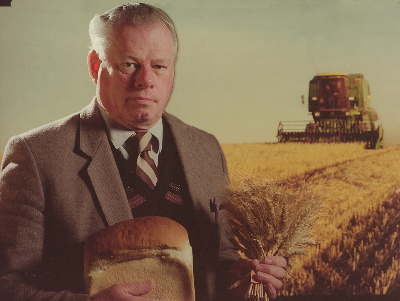 New Zealand's foremost wheat breeder,
Dr. Martin McEwan of Palmerston North, passed away on 19 January,
2004. In New Zealand, his achievements helped change bread from
the white, unsliced loaves of the 1960s and early 1970s to the
convenient, sliced multigrain loaves of today. While working for
DSIR, Crop Research, Dr. McEwan bred a string of highly successful
wheat cultivars, including Otane. Otane had excellent milling
qualities and produced exceptionally high-grade flours. These
qualities were important in the development of new bakery products
and processes that became possible in New Zealand after deregulation
of the wheat industry in the late 1980s. For a period in the early
1990s, Otane commanded over 80 % of New Zealand's wheat production.
Other successful wheat cultivars that Martin bred and named after
areas in the Manawatu were Rongotea (1979) and Oroua (1979), which
were grown from Southland to the Waikato River in New Zealand
as were other cultivars included Karamu (1972) and Endeavour (1994).
All these cultivars resulted from semidwarf wheat germ plasm he
brought to New Zealand. His influence continues today as young
breeders he mentored now lead New Zealand cereal breeding programs.
New Zealand's foremost wheat breeder,
Dr. Martin McEwan of Palmerston North, passed away on 19 January,
2004. In New Zealand, his achievements helped change bread from
the white, unsliced loaves of the 1960s and early 1970s to the
convenient, sliced multigrain loaves of today. While working for
DSIR, Crop Research, Dr. McEwan bred a string of highly successful
wheat cultivars, including Otane. Otane had excellent milling
qualities and produced exceptionally high-grade flours. These
qualities were important in the development of new bakery products
and processes that became possible in New Zealand after deregulation
of the wheat industry in the late 1980s. For a period in the early
1990s, Otane commanded over 80 % of New Zealand's wheat production.
Other successful wheat cultivars that Martin bred and named after
areas in the Manawatu were Rongotea (1979) and Oroua (1979), which
were grown from Southland to the Waikato River in New Zealand
as were other cultivars included Karamu (1972) and Endeavour (1994).
All these cultivars resulted from semidwarf wheat germ plasm he
brought to New Zealand. His influence continues today as young
breeders he mentored now lead New Zealand cereal breeding programs.
Dr McEwan also worked on other cereals, releasing the successful general-purpose feed oat Awapuni, the forage oat Enterprise for Australia, the black feed oat Finlay, the forage barley Opiki, and the triticale Aranui.
Martin's international contacts were considerable and included collaborations with the Plant Breeding Institute in Cambridge, England, CIMMYT, and Agriculture and Agri-Food Canada. Many of these northern hemisphere organizations today use New Zealand for out-of-season nurseries and multiplications, a concept initially developed through Martin's contacts.
Martin retired in 1993 and has spent recent years defining the genetic relationships of our 72 native Coprosmas. Breeding Corprosmas and cricket were life-long passions. He was a Fellow of the New Zealand Institute of Agricultural Science and received the New Zealand 1990 Commemoration Medal and the DSIR Ministerial Award in 1991 for Scientific and Technological Development.
Martin played provincial cricket for several years and past scorecards record successful father and son playing days. He is survived by his wife and two sons.